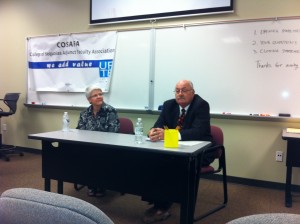
The College of Sequoias Adjunct Faculty Association hosted a forum at Brandman University in Visalia on October 7 for the two candidates on the November ballot for Ward 1 of the COS Board of Trustees. Incumbent Greg Sherman and challenger Laurel Barton, a former Visalia City Council member, participated in a forum that showed little disagreement on any of the issues discussed.
Moderator Stephen Tootle, a history instructor at COS, read questions from some of the more than 30 people in attendance, often tailoring questions to allow both candidates a chance to respond.
“This is a time to look at how we offer education,” said Barton in her opening remarks, stressing the need for board members to know COS students and what their needs are. “It’s important that we help our students get through quickly.”
Sherman noted that he has served on the board for two terms and this was his first contested election. “It’s been kind of fun,” he said. “I’ve had to do the things I didn’t have to do the first two times.”
He talked about why he is seeking a third term. “The students are the reason I’m on the board of trustees,” he said. He then noted that during his eight years he also served terms as president of the COS Foundation, seeing its resources increase from $1 million to “almost $10 million.” He added that three bonds were passed and two new COS campuses were built during his tenure. He also listed the hiring of Stan Carrizosa as COS president/superintendent as one of the things he was proudest of during his terms.
Sherman then addressed the accreditation issue that COS has been facing. Although Barton didn’t raise this issue at the forum, her campaign literature available by the door included the statement, “Laurel knows how dangerously close the College of the Sequoias came to losing its accreditation, and believes it is the role of the trustees to act early and decisively to guarantee this never happens again.”
“COS is strong today as a result of accreditation,” said Sherman. “We filed a final report to the ACJC (Accrediting Commission for Community and Junior Colleges) last Monday. The ACJC has asked COS to be a model of how to turn things around.”
In response to a question about new state legislation that will allow 15 state community colleges to offer four-year degree programs in vocational fields, Sherman responded, “We’d like to get a four-year degree here at COS,” adding that if COS becomes part of the program, the most likely degree would be in physical therapy.
If elected, Barton would spend her first 100 days “working on visiting most of the facilities. I would meet a lot more of the faculty and the students so I would have a better idea of who we are. Who is COS? It’s easy to lose track of who you work for.”
If re-elected, Sherman noted that the first 100 days of his third term would likely include COS getting off its warning status for accreditation. “Settling with the union would also be nice.”
When asked about the connection between COS and the community, Barton said, “It’s been sort of an eye-opener to me to find out what is going on in students’ minds and hearts. What I find is people who have a dream and have a family behind them and the will to succeed.”
Tootle then read a question about how COS might become more energy and water-efficient.
“One thing we’re doing right now is we’re considering putting solar on the Visalia campus and also on the Tulare campus,” said Sherman. “As far as water, one of the neighbors was complaining to me that we weren’t saving enough water as good citizens.”
Barton was asked what she imagined being proudest of if she served eight years on the board. She responded, “To have been able to complete some of the buildings on the Tulare and Hanford campuses, and to fulfill some of the projects that are just getting started.”
Replying to a question about her toughest decision in public office, Barton talked about her city council vote about the zoning of a proposed school on church property in an approach zone near the Visalia Airport. “The council chambers were packed; the hallway was packed. When the vote was taken, it was 4-1, and I was the ‘1.’ I was booed, but I thought it was valuable to protect children from being in an airport approach zone.”
The candidates were then asked about developmental education and ESL (English as a Second Language), and in getting funding for these programs.
Barton talked about her experience writing grant proposals for the City of Visalia. “I think that COS should be looking at this to give another service to our community, but (grants are) never free money. There’s always strings attached.”
Sherman would prefer to use any developmental education and ESL funds to enable local high schools to offer their students the classes necessary to make them college-ready.
To increase the rate of transfers from COS into the University of California system, Barton noted “a disconnect between what courses are taken (at COS) and what courses are needed (by the UC system).”
The Adjunct Faculty Association, which hosted the event, represents 309 part-time contingent faculty at COS.
